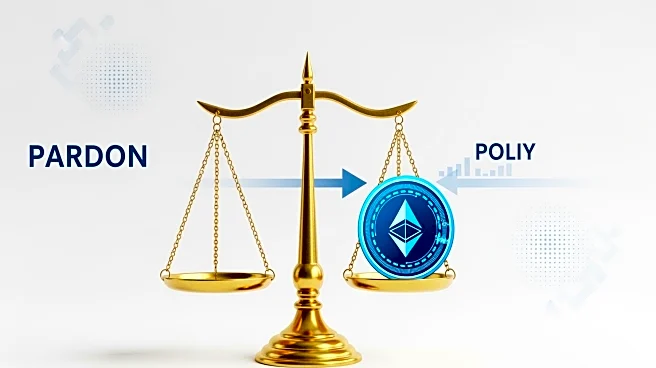What's Happening?
President Trump has issued a pardon for Changpeng Zhao, the founder of Binance, a major cryptocurrency exchange. This decision comes after Zhao's conviction for violating the Bank Secrecy Act and failing
to maintain anti-money laundering controls at Binance. The pardon is seen as a response to the Biden Administration's stringent policies on cryptocurrency, which had led to Zhao's prosecution. Zhao's conviction had previously hindered Binance's operations in the U.S., affecting its ability to secure banking relationships and regulatory approvals. The pardon is expected to facilitate Binance's re-entry into the U.S. market, potentially accelerating its business operations and restoring its standing in the financial world.
Why It's Important?
The pardon of Changpeng Zhao is significant as it marks a shift in U.S. policy towards cryptocurrency under President Trump. This move could have broad implications for the cryptocurrency industry, potentially easing regulatory pressures and encouraging innovation. Binance's return to the U.S. market could increase competition and provide more options for consumers and investors. However, the decision has sparked controversy, with Democrats raising concerns about potential conflicts of interest due to the Trump family's involvement in the cryptocurrency sector. The pardon may also influence the regulatory landscape, prompting discussions on the balance between oversight and fostering technological advancement.
What's Next?
Following the pardon, Binance is likely to focus on rebuilding its presence in the U.S. market, leveraging the clean slate to secure necessary banking relationships and regulatory approvals. The company may also work on enhancing its platform to align with U.S. regulations. Meanwhile, political and industry stakeholders will be closely monitoring the implications of this decision, particularly in terms of regulatory changes and market dynamics. The Treasury Department's ongoing monitorship of Binance may continue unless rescinded, which could affect the company's operations. Additionally, the pardon may lead to further debates on cryptocurrency regulation and the role of executive clemency in business-related legal matters.
Beyond the Headlines
The pardon raises ethical and legal questions about the influence of political connections in legal outcomes, especially given the Trump family's ties to the cryptocurrency industry. It also highlights the ongoing tension between regulatory enforcement and the promotion of innovation in the digital currency space. The decision could set a precedent for how future administrations handle similar cases, potentially impacting the global perception of the U.S. as a leader in financial technology regulation. Long-term, this development may influence the strategic direction of cryptocurrency companies operating in or seeking entry into the U.S. market.









